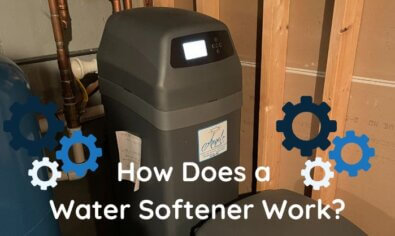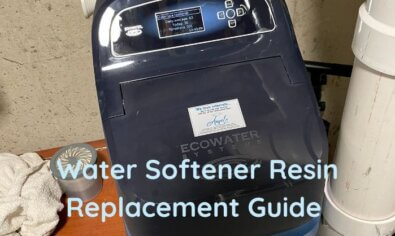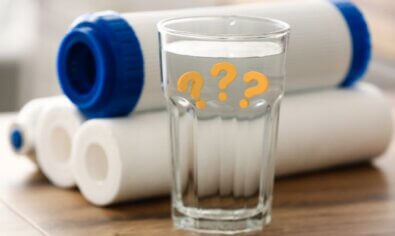How Chicago Water Filters Can Fix the City’s Lead Problem
In this article, you will learn:
Chicago still has a problem with lead and other contaminants in its water.
The best types of Chicago water filters are whole-house carbon filters and reverse osmosis systems.
NSF 53 or 58 certification indicates a water filter or RO system will give you trustworthy results.
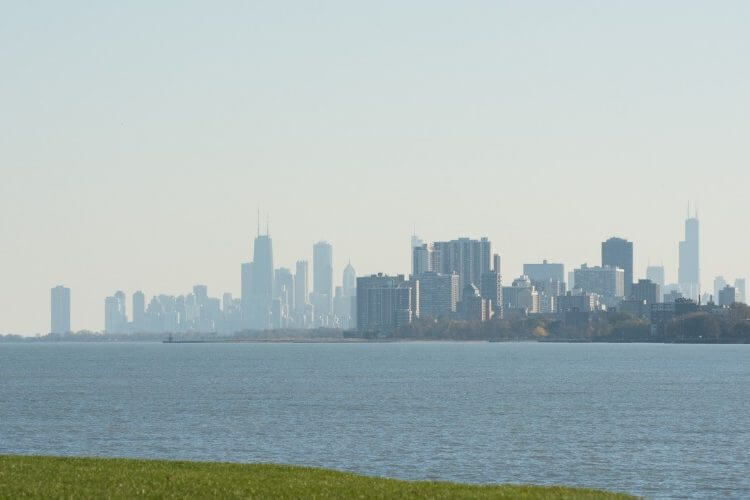
Here’s Why Chicago Water Filters Are Essential!
Chicago residents have a reason to be concerned about their water. Every other week it seems like there’s another news story about Chicagoans having their health threatened by lead contamination. It’s enough to make anyone want to never turn on their tap again and purchase bottled water for the rest of their life. (We wouldn’t recommend this strategy, by the way.)
Of course, some Chicagoans are also skeptical of all this hubbub about polluted drinking water. Is this the truth or just the sensationalist media conjuring up another story to scare us?
It’s important to know the truth. After all, if the local government isn’t doing enough to keep Chicago water clean, concerned citizens will have to pick up the slack.
One way to pick up the slack is by investing in Chicago water filters. But filters cost money. So, residents want to know why filters are necessary and worthwhile before making a purchase.
That’s what this blog is for! In this post, we will examine the problem with lead and other contaminants in Chicago water. Then we will explain how Chicago water filters address these problems and give you some expert advice on picking the right filter.
What is the Truth About Lead in Chicago Water?
Everyone has heard that Chicago has lead in its drinking water. But is this true, and what are the facts about this problem? Let’s take a closer look at the issue.
A Brief History of Chicago’s Lead Problem
Chicago’s lead problem began back in the mid-1800s when the city was building its plumbing system. The builders chose lead because of its strength and flexibility. They liked how easily the pipes could bend to fit them in tight spaces and assumed, rightly, that they would last a long time without needing repair.
Of course, back then, they didn’t know lead was harmful. But it wasn’t long before many Chicagoans started experiencing lead poisoning. And while other cities saw these results and banned the use of lead plumbing, Chicago refused. In fact, it wasn’t until 1986 that the city stopped using lead service lines, and that was only because the federal government banned it.
Why did it take the city so long? In short, Chicago’s politicians didn’t want to anger the plumber’s unions, who preferred using lead because they knew it would cost them votes.
Why Lead Contamination is Still Happening
Even though the government banned lead service lines in 1986, this ban did little to fix the damage already done. After all, the city already had nearly 400,000 lead service lines. So, it would take a lot of work to get rid of all that lead.
But in the years since 1986, the city hasn’t done much to address the issue. In fact, a 1991 federal law called the Lead and Copper Rule gave Chicago officials the excuse they needed not to act.
The law required the city to test a portion of its households for lead every three years, and if the levels were too high, they would have to replace the service lines. Unfortunately, it has been extremely easy for the city to pass these tests even as the lead problem has persisted. Critics say the reason for this is the tests aren’t thorough enough, and the law doesn’t require the city to test a large enough sample size.
And even though the city hasn’t installed lead service lines since 1986, its new installation practices have made the problem worse. The city frequently performs something called a partial lead service line replacement. They only replace a portion of the lead service line with copper piping. As it turns out, this practice causes a corrosive effect when the copper is combined with the lead, causing even more of the lead to leach into the water!
So, clearly, full lead service line replacement is the only way to fix this problem. And while the city has indicated that it’s moving in that direction, getting rid of all that lead will likely take multiple decades.
In other words, Chicago’s lead problem isn’t going away anytime soon.
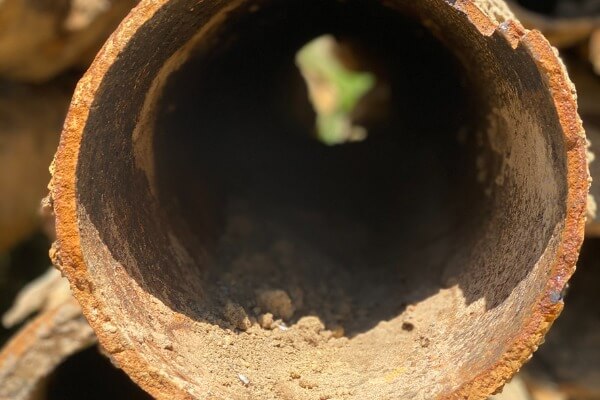
What Other Contaminants are In Chicago Water?
The threat of lead poisoning is enough to make Chicago water filters necessary. But here’s the thing: Studies show that many more contaminants are lurking in Chicago water, including chromium-6, mercury, radium and other emerging contaminants!
You may recognize the name chromium-6 (a.k.a. hexavalent chromium) from the 2000 film Erin Brokovich. This contaminant is just as dangerous in real life as portrayed in the movie, as it can cause cancer and other health defects. And, unfortunately, Chicago water contains a lot of it since it frequently gets into Lake Michigan water through industrial runoff.
Angel Water Now Offers Free Water Tests!
Don’t Guess, Test! Get Your Free Water Test Now and Take Control of Your Water Quality.
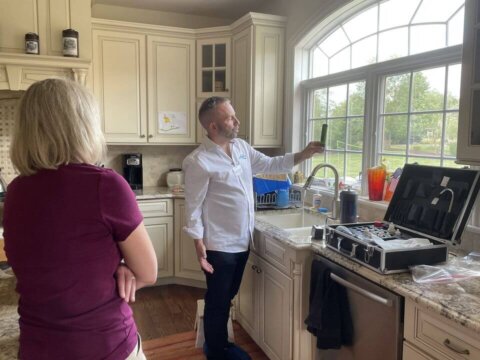
Mercury also gets into Chicago water through industrial contamination. In this instance, the pollution comes from coal-fired power plants, which produce coal ash containing mercury. When this ash gets in Chicago’s water, the mercury lurks there for a long time and causes all sorts of health problems, such as kidney and nervous system damage.
Radium is a naturally occurring element that can also cause kidney damage as well as lung cancer and problems in newborn babies.
These are just some of the many contaminants that studies have detected in Chicago’s water. And since the government isn’t doing much to protect you from them, it’s up to you to protect your health with Chicago water filters.
Which Chicago Water Filters Can Keep My Water Clean?
As we’ve seen, there’s a lot of bad news about your drinking water if you live in Chicago. But the good news is you can take control of what’s in the water you consume! Chicago water filters give you this power.
There are many different types of filters on the market. And the trick is finding the one that will filter out the pollutants you want to remove.
First, Test Your Water
The first step to finding the best water filter for your home is getting your water tested. A reputable company that performs EPA-certified tests can give you trustworthy results. These results should inform your choice of filter since different types of filters provide different levels of coverage.
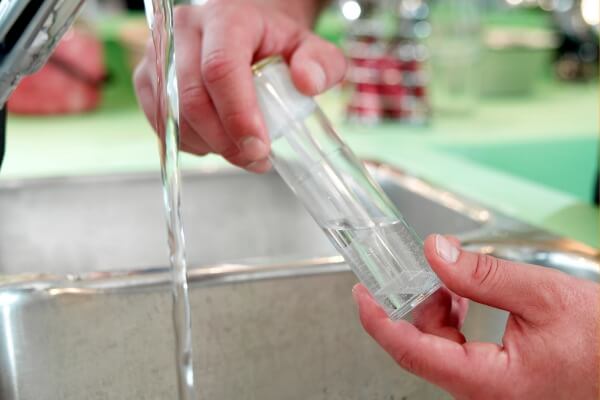
Next, Choose Between Whole-House and Point-of-Use
Now that you know what types of contaminants you’re dealing with, you can determine the best filter for your home.
There are two main categories of water filters: whole-house filters and point-of-use systems. As their name indicates, whole-house filters provide clean water to every fixture in a home. Point-of-use filters, on the other hand, can only filter the water for one appliance.
So, if your water contains dangerous contaminants that you want to keep out of your home entirely, a whole-house filter will be a worthwhile investment. However, whole-house systems also tend to be more expensive than point-of-use filters. Therefore, a point-of-use system may make more sense if you’re only concerned about using the water from one fixture in your home.
Next, Choose the Right Filtration Method
Another important factor to consider when purchasing a water filter is the filtration method. While there are many types of filtration methods on the market, the best kinds of Chicago water filters are carbon filters and reverse osmosis (RO) filters.
Carbon filters use activated carbon to pull contaminants out of the water as it passes through. These filters can reduce chlorine, lead, mercury and other common organic contaminants. However, many inorganic contaminants like arsenic and chromium-6 often get left behind.
On the other hand, RO systems are some of the most effective filters on the market. They filter out a wide variety of contaminants by trapping them as the water moves through a semipermeable membrane. These contaminants include lead, mercury, chromium-6 and radium.
Finally, Look for NSF 53 or 58 Certification
Whatever type of filter you choose, make sure it’s a trustworthy one. The most reliable certification on the market is NSF certification. NSF stands for the National Sanitation Foundation. This organization only puts its stamp of approval on water treatment products that have passed a rigorous testing process. So, when you see the NSF 53 stamp on a carbon filter or the NSF 58 stamp on a RO system, you can trust that it will do what it says it can do.
Ready to Invest in a Chicago Water Filter?
Chicago may have a lot of water problems, but no water problem is unsolvable! The right water filter will provide healthier water for your home and family for many years to come!
Need help picking the right water filter for your home? At Angel Water, our licensed experts enjoy helping people throughout the Chicago region navigate the tricky water softener market. We can test your water and help you choose the ideal option from our wide selection of NSF-certified water filters.
You can give us a call today at 847-382-7800 if you’d like to start the discussion. Or, if you’d rather continue your search online, you can try our interactive Water Wizard. This tool can help you determine the best water filter for you in just a few clicks!
Interested in a Water Softener System for Your Home?
You don’t have to live with a dry, itchy scalp and brittle hair anymore! It would be our pleasure to help you find the right water softener to make your showers enjoyable again.
Please give us a call at (847) 382-7800 or visit our water softener page to learn more.

